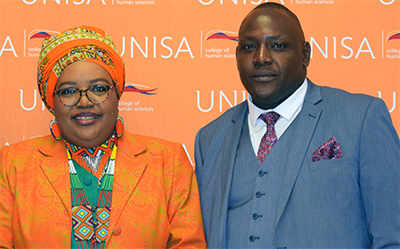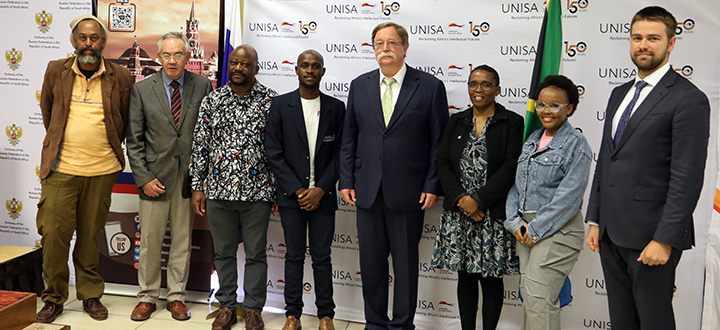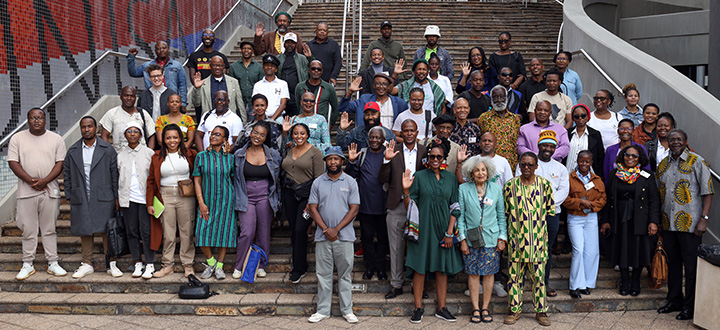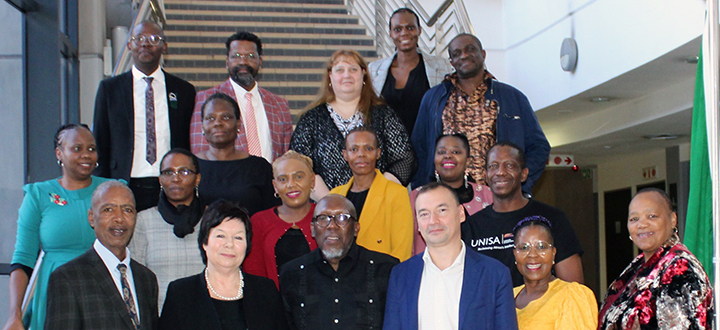College of Human Sciences
Educating and empowering spiritual leaders for change

Pictured are Dr Thoko Mkhwanazi-Xaluva (Commission for the Promotion and Protection of the Rights of Cultural, Religious and Linguistic Communities Chairperson) and Prof Thinandavha Mashau (Chair of the Department of Christian Spirituality, Church History and Missiology).
On Monday 27 August 2018, the Department of Christian Spirituality, Church History and Missiology engaged in an open conversation with the Christian community from various spiritual backgrounds deliberating on pressing issues around religion and Christian faith in the country and abroad.
The event was organised to serve two purposes. The first was to discuss a report on the commercialisation of religion and abuse of people’s belief systems undertaken by the Commission for the Promotion and Protection of the Rights of Cultural, Religious and Linguistic Communities (CRL Rights Commission). The second purpose was to showcase programmes offered by the Department including the Recognition of Prior Learning (RPL) procedure.
In his opening address, Chair of the Department of Christian Spirituality, Church History and Missiology, Professor Thinandavha Mashau emphasised that knowledge, proper training and education should be non-optional to churches and the society at large, if they indeed intend on being true to God who has called and sent them to serve his mission in this world. He made this point as reference to the strange Christian phenomenon that has recently emerged in the past few years, of practices like “doom prophets, feeding people junk and drinking fuel”. He described it as a kind of Christian phenomenon that unsympathetically feeds on the vulnerability of the poor for selfish enrichment. Professor Mashau added that this is happening because seemingly, a lot of people think that a religious practitioner needs no formal training.
Welcoming delegates to the Open Day, Executive Dean of the College of Human Sciences, Professor Andrew Phillips, who himself is a theological scholar, touched on the global standing of the College of Human Sciences’ Theology disciplines. He mentioned that these disciplines are staffed with more personnel, academic and support, than any other university in the in southern and northern hemispheres. He highlighted the College’s commitment to transformation and said that management have tendered a request for approval of the recurriculated Bachelor of Theology with the Department of Higher Education and Training, to make it available and open to all religious communities.
Delivering the keynote address was CRL Rights Commission Chairperson, Dr Thoko Mkhwanazi-Xaluva. She pointed out that the issues addressed in the report, are long standing and have been deliberately overlooked as a result of patriarchal privilege within religious circles. This she said has consequently rendered the CRL Rights Commission controversial because it is led by a woman who dared to call out the dysfunctional and predatory behaviour of “strong men politics” in churches.
She said considering that it is women’s month, it is worth noting that issues of gender, classism, abuse of power, and abuse of the vulnerable are the realities of this country. Her views are linked to explicit sexual exploitation that is ongoing, despite the everyday criminal charges and reports by vulnerable young girls and women against “shady” religious leaders.
She then delved into the investigative procedure that was followed to consolidate the report on the commercialisation of religion and the abuse of people’s belief systems. She said they looked at societal perception and thinking and the legal framework to aid their intervention measures. The commission’s findings on the above elements informed what could be a possible remedy for this Christian pandemic.
The commission recommends that there needs to be an umbrella body that oversees all worship centres and their leaders, a peer review committee, and a national registrar for all those umbrella organisations to be enlisted. She also said that the Department of Home Affairs’ registration system should be reviewed, together with the registration procedure of religious centres as non-governmental organisations. According to Dr Mkhwanazi-Xaluva the registration of all churches should be moved to the CRL Rights Commission to allow for a clearer scrutiny and tighter monitoring of church affairs.
* By Katlego Pilane
Publish date: 2018-09-04 00:00:00.0

 Unisa's student leadership engage with Russian ambassador
Unisa's student leadership engage with Russian ambassador
 Re-igniting and re-imagining Pan Africanism, Afrocentricity and Afrofuturism in the 21st century
Re-igniting and re-imagining Pan Africanism, Afrocentricity and Afrofuturism in the 21st century
 Unisa and Russian State University for the Humanities explore collaborative opportunities
Unisa and Russian State University for the Humanities explore collaborative opportunities
 Young Unisa science stars join elite Lindau Nobel Laureate group
Young Unisa science stars join elite Lindau Nobel Laureate group
 Education MEC addresses Unisa autism seminar
Education MEC addresses Unisa autism seminar